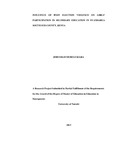| dc.description.abstract | A status report by the Kenya Human Rights Commission estimates that of the
663,921 displaced in Kenya after the 2007-2008 post-election violence,
350,000 sought refuge in 118 camps whereas about 331,921 were integrated
within communities across the country. Although those in camps were finally
resettled, the ones integrated within the community were more or less
forgotten. The purpose of this study was to investigate the influence of the
post election violence on girls' participation in secondary education in
Nyandarua South Sub County, Kenya. The study focused on schools outside
the IDP camps. Specifically, the study objectives were to determine the extent
to which absenteeism, psychosocial support, livelihoods and separation from
family members influenced girls' participation in secondary education. The
study was grounded on Jerome Bruner’s Discovery theory that postulates that
learning is an active process in which learners construct new ideas and
concepts based upon their current or past knowledge. The study used
descriptive survey design whose target population was 4799 individuals. The
study used purposive technique to target 30 girls for the study. Random
sampling technique was employed to sample the schools and consequently the
principals, teacher counselors, class teachers of all classes and students in the
sampled schools. The sample size was 127 individuals. Questionnaires were
used to collect data with descriptive data analysis being done. Outcome of data
analysis was presented in frequency and percentage tables and interpreted
along the objectives of the study. The study revealed that though absenteeism
affects majority of girls from displaced families and is mainly contributed by
lack of school fees, it does not always translate to dropping out of school.
There is poor distribution of personnel with formal training in guidance and
counseling skills leading to a disconnect in provision of guidance and
counseling services. The emotional state of the girls is the biggest challenge
facing counseling in schools, while participation in co-curricular activities by
the girls affected by the 2007/2008 Post Election Violence shows that healing
is taking place. The study further revealed that financial difficulties and
trauma have the highest effect on the girls and that families of affected girls
are large with more than four siblings in each thus overburdening the parents.
The study has concluded that absenteeism, psychosocial support by the
schools, parental livelihoods and separation from family members greatly
influenced the participation of girls in secondary education in the study area. It
has gathered information that could help education authorities understand
what kind of support is needed by girls from PEV affected households. It
could also help the schools identify and set up support mechanisms to help
these girls so that they proceed with their education normally. Further, the
study could assist policy makers in the education sector to put in place policies
that ensure the protection of children emerging from electoral violence in
future. The study recommends that a similar one be conducted on the boy
child, a replica of the study be done in other parts of the country and an
examination of learners affected by the violence be done after they complete
school. | en_US |

